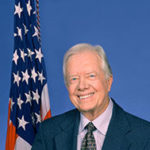Jimmy Carter in conversation with Sally Osberg at 2018 Skoll World Forum
Speakers
-

,
Jimmy Carter was born in rural Georgia in 1924 to a farmer/businessman and a registered nurse. Most of Carter’s childhood neighbors were poor African-Americans, and though his father supported segregation, many of Carter’s friends were the children of black farmhands. Early on, he learned of marginalization and unjust distribution of resources.
He attended public schools and graduated from the U.S. Naval Academy, rose to the rank of lieutenant, and served as senior officer of the pre-commissioning crew of the second nuclear submarine. After his father’s death, Carter returned to Georgia to run the family farm and business, and quickly became a community leader. He served in state politics and, as Georgia’s governor, advocated for civil rights. In 1977 he became the 39th president of the United States. He helmed peace treaties in the Middle East, crafted significant environmental protections, and created a new Department of Education.
He opened the Carter Center in 1982 to resolve conflict, promote democracy, protect human rights, and prevent disease. The Center spearheaded the international effort to eradicate Guinea worm disease—poised to be the second human disease eradicated in history. Every year since 1984, Carter has volunteered a week with Habitat for Humanity,
building and repairing thousands of homes in 14 countries. He has authored 31 books, ranging from personal history and fiction, to urgent polemics and poetry. As a clarion voice for the disenfranchised, he won the Nobel Peace Prize in 2002.
In recent years he has turned his keen and compassionate eye to what he calls the number one human rights abuse: systematic injustice against women and girls. “Women are key agents of the change we need,” he said recently. “When half the world’s population is not consulted on important decisions and policies, it is no wonder that so many problems persist.”
-

As the first President and CEO of the Skoll Foundation, Sally Osberg partnered with Jeff Skoll to build it into the leading philanthropy in the field of social entrepreneurship. During her tenure, the Foundation supported more than 100 entrepreneurial organizations driving equilibrium change on many of the world’s most pressing problems and developed innovative platforms for connecting civil society, government and private sector leaders with societal problem solvers. Among these platforms are the annual Skoll World Forum on Social Entrepreneurship, the Skoll Centre at Oxford University’s Said Business School, and the Sundance Institute’s “Stories of Change” initiative.
In 2015, Sally and Roger Martin published Getting Beyond Better: How Social Entrepreneurship Works, which articulates a theoretical framework for social entrepreneurship and distills lessons for practitioners, academics and impact investors. Her thought pieces have appeared in leading social impact and business journals and books; in 2015, she and Roger Martin were honored by Thinkers 50 for their intellectual leadership in the field of social enterprise.
Prior to joining Jeff Skoll and the Skoll Foundation, Sally served as the founding Executive Director for Children’s Discovery Museum of San Jose, a pioneering institution in the field.
Sally currently serves as the Chair of the Camfed (the Campaign for Female Education in Africa) USA Foundation, on the Philanthropy Advisory Council of the Royal Bank of Canada, on the Advisory Council of the Elders, as Vice Chair of the Social Progress Imperative and as a board director for New America and the Palestine-based Partners for Sustainable Development. She is also an Associate Fellow of the Said Business School of Oxford University.
She received her M.A. in English and American Literature from the Claremont Graduate School and her B.A. in English from Scripps College, where she was elected to Phi Beta Kappa.